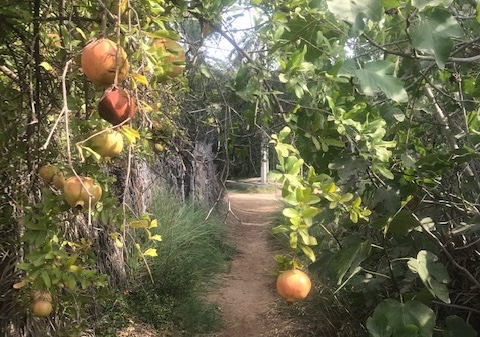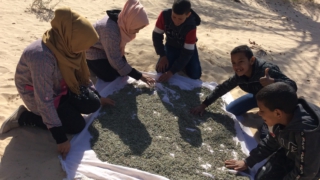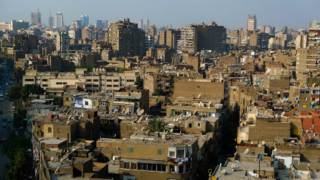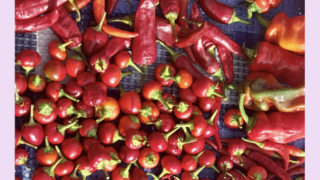The poisonous gift from Dutch tomato growers in Tunisia: rising exports, domestic shortages.
Dutch horticultural companies are setting up in Tunisia so they can grow cherry tomatoes and peppers in winter too. By doing that, they contributed to a 20 percent rise in Tunisian tomato exports in recent years. The Dutch, therefore, see their presence as a win-win situation. But many Tunisians think differently: ‘Depletion of water resources and exploitation of the workforce without any benefit to us.'
Google Maps navigates us along the long, narrow road through the parched landscape behind Fondouk Jedid, a hamlet in eastern Tunisia. When the navigator says ‘you have reached your destination,’ our brains search for the ‘high-tech greenhouses’ from the photos. It takes a while before we discover the pale white fence with the peeling sign among the yellowed trees and bushes: Rainbow Horticulture. Part of Rainbow International, a global export group of Dutch producers that is prominent in the world of vegetable cultivation. A story of Tunisian-Dutch passion and pride, according to their website.
Half hidden behind the wild vegetation, the roof of the greenhouse shimmers. A long, heavily rusted pipe lies around the site. No tractors, lorries, pallets or workers walking back and forth. On a fairly chilly Wednesday morning in August, you would expect something different. Bad timing, we read afterwards on the website. The production period runs from October to August, the low season compared to European production. Around us, the roads and hamlets are deserted, it feels like we are in a hastily evacuated area. Ten minutes and two bends further down the road, just behind the ten hectares of Rainbow Horticulture, a car stops in front of a small yard. Our driver apparently knows this farmer and calls her out for us; a small, veiled woman in her seventies with large, rough hands. She is willing to talk, but does not want her name in the article. Her slight impatience, awkwardness and body language make it clear that she does not understand what is interesting about her story or that of her neighbours at Rainbow Horticulture. Of course she knows the nursery. No, she has never spoken to the management or employees. Yes, it is an exporter of cherry tomatoes and peppers. ‘No, it never bothers me. Sometimes their buses with employees drive by.’
Behind her chickens and her skinny cow, Rainbow Horticulture’s gleaming high-tech greenhouses and slick marketing seem like something from another world. Her farm has been passed down from generation to generation. ‘It used to be better. In recent years, it hasn’t rained,’ she says, now a little more talkative. ‘Year after year, the drought ruins a large part of our harvest of tomatoes, peppers and herbs. There is nothing left for the cows to graze on. Animal feed is becoming unaffordable. Selling animals is the solution. Almost all our water comes from our self-built (illegal, ed.) well.’ She gestures towards a stone well with an iron handle in the middle of her yard. ‘The deeper underground, the saltier and poorer the quality of the water. In the long run, this is unsustainable. But we really can’t afford irrigation water.’
The conversation returns to Rainbow Horticulture: whether her Tunisian-Dutch neighbours are also suffering from the water shortage, and if so, how they are solving it. ‘Did you see that pipe around the site?’ asks our hostess. ‘It runs to Joumine, the nearest dam. They can easily afford the irrigation water.’
Tunisia is one of the driest countries in the world
As the woman stands there, her daughter by her side – they look lost amid the vast yellowed plains – she would be the ideal protagonist for a story or reportage about the struggle for survival of Tunisian farmers, who, Tunisian newspapers alarmingly report every summer, ‘are being ruined by unprecedented drought’. The country ranks somewhere around 18th on the World Resource Institute’s list of the world’s driest countries. And of that small amount of water, about 80 per cent is used in the agricultural sector.
What is striking, researchers from the French Institut National de la Recherche Agronomique et l’Environnement (INRAE) wrote in February, is that in Tunisia ‘most of the irrigation water is used excessively to meet foreign demand, while local needs are not always met. Groundwater resources are largely non-renewable and are being overexploited.’
Economically speaking, this is a smart move, according to the report, ‘because the water used to produce export products for the international market yields more than the water needed to grow a cheaper product for the local market. But this situation can lead to a worsening of regional water imbalances.’ In other words, Tunisian policy favours agricultural exporters such as Rainbow Horticulture over local farmers, which is beneficial for the economy in the long term but disastrous for groundwater reserves.
Critical economists have calculated that these economic benefits are somewhat debatable. According to them, Tunisian agricultural policy is the sum of neo-colonial dictates, kindly sold as “aid” or “bilateral cooperation”. This applies to the entire African continent.
Exploiting historically grown inequalities
After the colonial wars of liberation – Tunisia gained independence from France in 1956 – the former colonisers, now united in the EU, cleverly exploited the historically grown inequalities by creating an economic model that was highly advantageous to them. This created a fundamental flaw, initially convincingly packaged in the theory of comparative advantages.
The products that countries such as Tunisia import – technology, knowledge, semi-finished products, even packaging – are expensive. They have high added value. But the export products that offset this – labour, land, energy – are cheap. They yield little on top of production. Virtually all EU trade agreements are based on this logic. Tunisia has turned into a real tax haven, says economic researcher and tax expert Amine Bouzaiene on the phone. ‘Our country became fully involved in the international race to lower taxes and reduced taxes for the rich and businesses several times. This resulted in greater social inequality and fewer jobs. But it was all for the sake of exports. Foreign companies, which benefit from low wages and our natural resources, pay no tax at all in the first few years. We can now see where that leads.’
It is indeed impossible to overlook the impact of what are known here as “100% exporters”. ‘In summer, we sometimes go 3 or 4 days without drinking water,’ says Mahmoud, owner of a farm behind Rainbow Horticulture. The Spanish fruit and vegetable exporter SanLucar, winner of important environmental awards, is surrounded by its own mountains of waste. Jeans manufacturer Yousstex, supplier to the Dutch brand Mud Jeans, is located in the middle of a residential area and, according to residents, discharges chemical waste into the nearest river. Le groupe chimique de Gabès, a phosphate processor in eastern Tunisia, is destroying the oasis.
Scrolling through Facebook, you stumble across scathing comments about Desert Joy, another Dutch tomato company and one of Rainbow Horticulture’s even larger partners, located near Gabès. “Depletion of water resources and exploitation of the workforce without any benefit to us. We only see our wealth on the smuggling boat on its way to Europe,” writes a certain Fawsi Adnour.

The Gabès region suffers from severe water shortages (photo @Fairouz ben Salah)
“We love Tunisia”
‘We love Tunisia’, exclaims Arno Verboom of Desert Joy owner Agro Care, Europe’s largest tomato producer, in their promotional video. ‘I searched for a long time for a place where we could produce tomatoes in winter. Because in the Netherlands, we don’t have enough tomatoes for our customers in winter. Tunisia has beautiful sunlight, plenty of water, a gas pipeline to Algeria and is a short distance from Europe.’
Thanks to this enthusiasm, a second Agro Care branch, Hicha Joy, has now been established in Tunisia, just a few dozen kilometres from Desert Joy. This expansion has probably contributed significantly to the recent growth in Tunisian tomato exports, which, according to the latest figures, have increased by around 20 per cent, with the vast majority going to the Netherlands. Although tomatoes currently account for only 0.34 per cent of total exports, the goal, as concluded by the AgriTunisie website, is clear: “To increase production capacity and strengthen Tunisia’s position in the international market for cherry tomatoes.”
Better not, responds Mehdi Abdelli, former advisor to the Tunisian Ministry of the Environment and now director of his own company, Ecopath Solutions, by telephone. ‘Tunisia still has about six or seven European tomato exporters. Their impact on the environment is seriously underestimated. If only it were just water consumption. Greenhouses affect the quality of our soil and emit waste and CO2. And then there are always the health risks for workers from inhaling chemicals and pesticides.’
Back to Rainbow Horticulture in Fondouk Jedid. Director Mohamed Ouechteti, still on holiday, insists on a win-win situation over the phone. ‘The profits from exports are all invested sustainably. Thanks to advanced technology, we don’t waste a single drop of water. What’s more, around 20 to 30 per cent of the water is recycled,’ “Efficient and sustainable,” the company writes on its website. “The aim is to minimise the environmental impact of our activities as much as possible. And we make it a point of honour to limit the use of crop protection products as much as possible.”
Farmer Mahmoud is ‘quite happy with Rainbow Horticulture, anyway. It’s a hive of activity. They create jobs for our young people. That way, they don’t have to leave.’ According to Ouechteti, depending on the season, this involves between 150 and 400 jobs.
But working conditions are not ideal, according to former Rainbow Horticulture employee Mohamed. In spring and summer, the plastic greenhouses are ‘unbearably hot,’ he says over the phone. ‘I worked with pesticides and hazardous substances. Without masks or gloves. For 500 dinars, 148 euros, per month (slightly more than the Tunisian minimum wage, ed.). Once, I injured my hand in a collision with a crane truck. My employer reimbursed the medical costs, but not the weeks I was off work. One female colleague died after falling from a vehicle. Another colleague died from inhaling toxic gases.’
According to an employee, who does not want his name mentioned in the article, three female employees of Rainbow Horticulture lost their lives in industrial accidents between 2022 and 2024.
The Greater Middle East Platform has been unable to verify the information about the fatal industrial accidents. Trade union leader Chokri Ben Salah says he is ‘not welcome’ at the Tunisian-Dutch tomato farm.
The management of Rainbow Horticulture calls the accusations “slander” and points out that no evidence has been provided. They claim that no fatal industrial accident ever took place. According to them, these are fabricated stories by former employees who are trying to discredit the company.
Faïrouz ben Salah lives and works in Tunisia and is an analyst and journalist.
Share this post via


